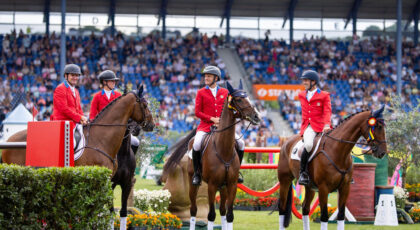If you’ve read Horse Brain, Human Brain, you know that our human noggins are designed to rely on vision as their primary sense, but horse brains are ruled by smell.
True, my green Warmblood, just helped me work out a nice little application of that knowledge.
Young horses tend to explore objects with their mouths—objects like halters, lead ropes, fly masks, jackets, pockets, reins, and oh yeah, reins. True is no exception.
I’ve been using the three techniques described in an earlier article (“Mr. Mouth”) for more than a year. They’ve been successful with every object except the reins. I purposely use only my oldest, scungiest reins on young horses—no sense getting the better sets all chewed up. While True doesn’t mouth his reins as often as he once did, it’s time he stopped.
So last week, I tried something new. Horses have all the brain machinery to sniff out odors and scents as well as a bloodhound can. Yes. A bloodhound! So it seemed to me that all those fancy neurons could be put to work to reduce True’s eagerness to mouth his reins while being bridled and led.
First, I tried using a bitter-tasting formula called Mavala Stop, which is designed to keep children from putting their fingers in their mouths. It’s for children, so it’s gotta be safe, right? I painted this stuff all over my leather reins near their attachments to the bit.
And I waited for the magic. Which never came.
True never seemed to notice the formula; if he smelled or tasted it, I never knew. He also kept mouthing the reins, even within minutes after applying the $$special$$ formula. After several tries, I gave up.
Enter the hot sauce. It’s edible and therefore safe, easy to find, and cheap.
I had to be careful not to smear hot sauce on the bit itself, because we want the horse to accept and like his bit, to open his mouth eagerly for it. So, instead, I cut two strips of fabric—an old barn-stained tee shirt—into rectangles about 3” long and 1” wide. I soaked them overnight in Sriracha sauce.
You can use any kind of hot sauce, but Sriracha works well because it doesn’t require refrigeration, so it can just live in the tack room. Plus, it comes in such large containers that there’s usually too much in my pantry and I want to get rid of some.
Next morning, when the strips were fully saturated, I folded them and rubber-banded them to the reins about 4” from the bit. Right where True tends to take them in his mouth while being led. If he preferred some other chewing location, I would have placed the strips there.
True’s first reaction was obvious. He accepted the bridle and bit as always, no trouble there. But when he turned his athletic lips to grab a rein, he stopped. His eyes widened, and he raised his head a bit. Then, he produced three huge flehmen responses in a row.
(A flehmen response occurs when the horse lifts and extends his mouth, curling his upper lip back to hold the air inside his nostrils. You’ve seen it, right? It allows the horse to use his secondary smelling organ, the vomeronasal organ, located inside his nose.)
After that, he never tasted the strips; he didn’t need to. And he hasn’t touched the reins with his mouth in four weeks of near-daily riding. I squirt a little more Sriracha sauce on the fabric once a week or so, to freshen it up.
Soon, I will remove the strips and see what happens. Based on my knowledge of human brain science, my guess is that True’s rein-chewing habit will be broken after three to four weeks of this intervention. After that, I shouldn’t have to use the Sriracha… and I can get the good reins out so that viewers don’t think True and I are slovenly in crummy tack!
For now, I’m happy to be using a horse’s astounding sense of smell to teach him something useful for daily riding life.
Brain-Based Horsemanship is a weekly column that chronicles Janet Jones, PhD, and her journey with True, a Dutch Warmblood she trained from age three using neuroscience best practices. Read more about brain-based training in Jones’ award winning book Horse Brain, Human Brain.
Janet Jones will present “Brain to Brain: Cross-Species Communication between Horses and Riders” at the World Equestrian Center in Ocala, Florida, on March 14, 2024. Come to the talk and enjoy the international Winter Spectacular Hunter/Jumper Horse Show too. Learn more and reserve your tickets at https://janet-jones.com/product/janet-jones-ticket-sales.
A version of this story originally appeared on janet-jones.com. It is reprinted here with permission.


 November 22, 2023
November 22, 2023 


























